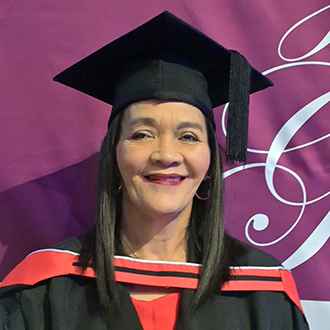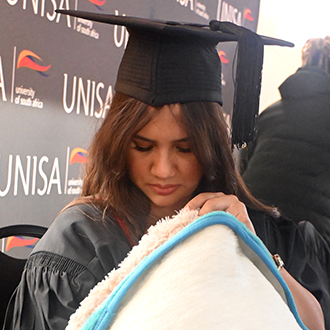News & Events
Unisa Western Cape celebrates four extraordinary graduates
The graduation season is a special time at Unisa. Those who have experienced their own graduation or who have worked at such a milestone event will know that the joy and excitement at a graduation ceremony are palpable.

Charmaine Dunn
As the “University of the Land”, Unisa plays a pivotal role in helping students from all walks of life achieve their goals by bettering themselves through education. As a leading online academic institution, Unisa fosters the dreams of former domestic workers and car guards who proudly walk the stage to obtain their qualifications, finally making their dreams a reality. The work done by the Advocacy and Resource Centre for Students with Disabilities (ARCSWiD) provides invaluable learning support and resources to those students living with a disability, ensuring that no one is excluded from the opportunity to further their studies.
During this auspicious time, social media is abuzz with positive stories celebrating our graduates, especially those who have overcome tremendous odds to pursue their studies. Before the graduation ceremonies held in Cape Town on 6 and 7 June, an invitation was sent out by the Western Cape Communication and Marketing Department to all graduates, inviting them to share their stories. The aim was to share with the university community personal accounts of how being a Unisan has changed their lives. This was done with the hope of inspiring others who are just embarking on, or are in the midst of, their study journeys, and to show our graduates that we are extremely proud of their achievements.
Of the numerous responses received, a common theme was evident in each student's account: our students possess incredible grit and determination. Pursuing a tertiary qualification via distance learning is no mean feat, even when you have all the tools, such as a stable internet connection and one time zone to contend with. Being a CODeL student at sea presented notable challenges for Natalie Fine. She decided to embark on an LLB degree in 2020 while working on a cruise liner. “Despite numerous technical challenges,” she said, “there were many times I wanted to give up, but I persisted, and finally not only completed my LLB degree, but did so with distinction.”

Tasneem Arends
Kevin Jacobs and Charmaine Dunn also stood out, as they both decided to pursue their studies later in life. For Jacobs, who ran his own successful business for several years, earning his degree at the age of 60 was the fulfilment of a lifelong dream. Whilst initially challenged by the intricacies of virtual classrooms, self-study and managing deadlines, he is thankful for the flexibility of online learning that allowed him to tailor his routines to fit “both worlds”.
Dunn’s story evoked the most reactions on the Western Cape’s Facebook page, with representatives from mainstream print media reaching out to the university to feature her in their publication. Dunn is a 61-year-old grandmother of three who hails from Manenberg in Cape Town. She too qualified with her LLB degree. Commenting on her achievement, Motale Nkgoang, the Regional Director for the Western Cape Region, said: “This remarkable milestone embodies the University of South Africa’s vision of shaping futures in the service of humanity. Her dedication to lifelong learning is truly inspiring, demonstrating that education knows no age limits.” He added that “the mainstream and social media have focused on the negative social perceptions that continue to persist on the Cape Flats. Through her journey as a lifelong learner, Dunn has shown that the other side of the coin indeed exists.”
An opportunity to capture an impromptu photograph during the final graduation ceremony resonated with several students online, especially those who are wives and mothers, juggling their families, work, and studies. Tasneem Arends’s three-month-old daughter Yumna did not care that her mother was attending her graduation ceremony to obtain her LLB degree. Staff working at the ceremony spotted Arends's frazzled husband trying to calm down their little one, who needed a feeding. She, of course, was not mollified until her mom could provide her much-needed sustenance. Fortunately, Arends was among the first students to be capped, and she could leave the venue to take care of her daughter’s needs. The saying “a picture paints a thousand words” could not be more accurate in this case. Several of our warrior moms, who are also students, shared their experiences of raising a family while pursuing their studies.
Showcasing these “ordinary” individuals proved that Unisa is the African university in the service of humanity. The university’s students truly come from all walks of life. Unisa staff take great pride in playing a part in shaping students' futures.
* By Vicky-Lee Lee Shew, Communication and Marketing Officer, Western Cape Region
Publish date: 2025/07/09
